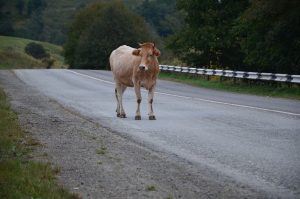
In the Rocky Mountain States like Idaho, Wyoming and Utah, raising livestock is a major contributor to the economy. Many farmers and ranchers make a living from raising livestock for consumption and other purposes. What about livestock and vehicle crashes? Understandably, farmers and ranchers take grievance with injuries or fatalities to livestock due to a driver’s negligence. Can a driver be held liable for striking or hitting livestock while driving, or due to other negligence? What about trespassing on a farm? While liability varies from state to state, open range laws in Idaho allow a farmer or rancher to seek damages from the driver for livestock injuries and fatalities.
How is Livestock Valued and Classified?
In Idaho, the legislature established statutes for animal cruelty and for killing an animal maliciously or intentionally. This includes farm animals and livestock. Idaho Code § 25-2806 (2020). Any person who kills or maims pets or livestock is liable to the owner for damages. Idaho Code also allows a livestock owner to kill a dog if the dog is found to be injuring or killing their livestock. The Idaho Open Range Law states that even if a rancher has a broken or damaged livestock gate or fence, and the animals escape the pen enclosure through the broken fence, a motorist can still be held liable for hitting the animal. In turn, the rancher enjoys immunity from paying for damages to the driver’s vehicle from the impact with livestock. However, this law only applies to open range areas, which are miles from major districts, cities, and villages, where cattle are permitted to graze and roam. Idaho Code § 25-2118 (2020).
Bringing Suit for Negligence
If you have a claim for damages, as the plaintiff you have the burden of proof. The crux of any personal injury claim is establishing that the proximate cause of the defendant’s negligence caused your injury. After a consultation with our firm, we will gather evidence and prepare documentation on your behalf. If the defendant does not want to settle after a demand letter, we move to the litigation phase.
We then file a complaint. A complaint explains the cause of action against the defendant, including facts and synopsis of the incident in question, why the defendant is liable and what damages the plaintiff is seeking. The defendant can either answer the complaint, file a pre-trial motion or simply ignore it. After a specific time period if the defendant does not respond, the plaintiff can request an order of default from the court. An order of default allows the court to order in favor of the plaintiff according to Idaho Rule of Civil Procedure 55(b). Otherwise, the discovery phase begins.
In a personal injury claim, our litigation attorneys work to identify potential causes of action for the plaintiff. We may file a complaint under more than one cause of action for one plaintiff and the plaintiff might be entitled to both compensatory and non-compensatory depending on the nature of the occurrence. Your case strategy will be uniquely tailored to the facts of your claim.
Schedule a Consultation with Our Attorneys
If you are a farmer or rancher that suffered livestock loss or injury due to another person’s negligence, you do have a claim, but time is of the essence. While there are usually no civil penalties for striking a wild animal, pets and livestock are assigned monetary and sentimental value. Because of this, you have the right to compensation for your damages. Contact the attorneys at Rocky Mountain Personal Injury Center today to discuss your options.




